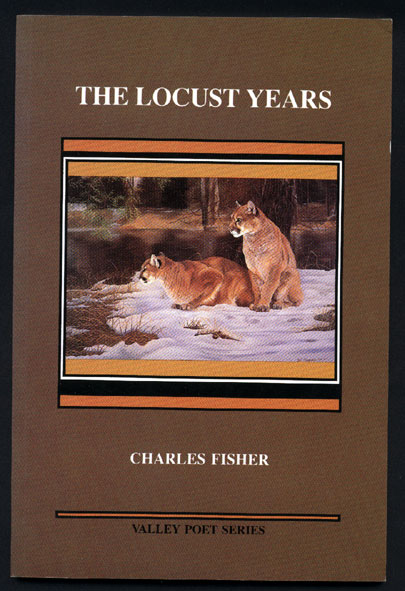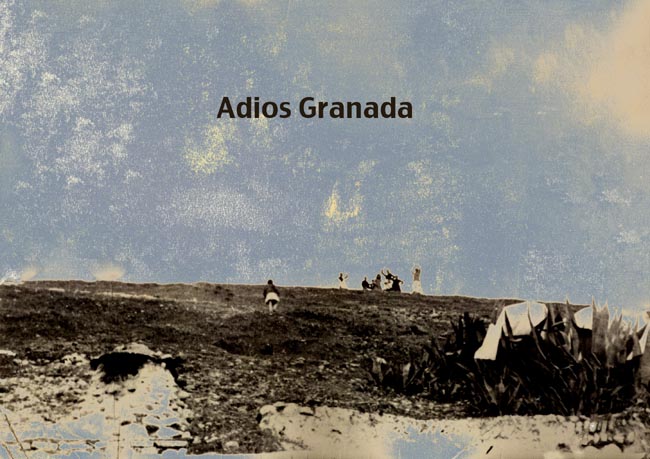Leaving England, 1953
Not much by way of luggage or farewell
Here at Southampton harbour. Be it so.
Whatever might be said is said by now
As one by one along a warehouse wall
Pathetic ribbons break apart and fall
Music. A cheerful bell, an organ blast
To clear the deck and blow away the past.
A time for celebration? Time will tell.
The great ship moves to meet the Atlantic swell.
Vast emptiness. I pitch the locust years
Like rubbish to the gulls for they were full
Of broken promise. Yet some good may come
From parting, inasmuch as common cares
Make all directions equal and the whole
Dark-spinning, crowded globe to be my home.
Beyond the coast in oriental skies
venus is rising. Mirrored in the foam,
Her path is radiant.
Circles.
Cammarch Waters
Musical as birds are the Cammarch waters I see
Keeping the white, slow village; and all around
Lie the familiar meadows. Bitterly
Have I missed you, Cammarch, and my own high ground.
Oh, dark as August oaks, older than they,
Flowed the wide river then; time brought no tears
I was immortal as the long summer day
My love was Wales, her tremendous signatures.
Walking in hills the shape of thunder I learned
An alphabet of stone, how to decipher
The speech of mistletoe, and when the wind
Spent on a beach or grass cast up its treasure
I ran to grasp each secret and syllable
Hero and castaway, the wreck of fable,
The wish for love, the heavy news of death
Which soon I leave for other hands to take
And mark until the tongues of water break
Give me this gift, bird-throated Cammarch, the notes
Learned of Rhiannon. They are mine to take.
Some Prodigies
Mozart, a lorgnette's target, child without toys,
Consumed utterly by his own costly gift,
Disdaining the dancers by his precocity
Was rewarded at length with a formal curtsy.
Jesus of Nazareth, wise as miracles,
Instructed priests in childhood, and he died
Crucified and forsaken cruelly,
Stars, angels, kings surround his nativity.
Athenian boy, swift master of hexameters,
And voyageur through dreams, Thomas De Quincey;
Sleep soundly now. Time to your tomb has sent
Laurel and poppy both for ornament.
Nelson walked placidly through the dark wood
To find his parents. Oh, he felt no dread
Of owl, or hooded ghost. For lacking fear
Men shot him down, put blood in his admiral's gear.
Beset by sanity and climate, another
Outwitted both, though sly and preoccupied
With writing, and men will weep, having quite forgotten
The lives of kings, the death of Chatterton.
Between the uplifted bow and the fired string
Is time to note these several prodigies.
Cease, now. The work begins. People are looking.
Norwich 1942
In the bright city, bombs are breaking like flowers;
Over the houses, lamps and lanterns are drifting
Clearer than moonlight, white as Lucifer
Or drop, spilling the light into the crawling fires
Pause at the shattered window
At sudden craters, see the slums
Gathering a rose fire
Fit for a town of dreams to wear
Hear on the wind the flames' imperative
Voice, the colour of kings; the cackling bracelet
Of pubs and churches lit like a pantomime
And yet we live
Aware of this dark hill, the orchard carpeted
With cool, green apples. Only the birds are fled.
Chorus for a poet
Stared from a human house
Your death was ominous
So formal. With Madrid
fell and encircled head,
And the wide windows lost their light.
Though he for armour wears
The mail of hexameters,
Syllable and story
To spell war's history
And the white walls of Hellas
Saved once by a sad chorus,
Make an immortal statement,
His plea was impotent.
Songs may no more protect
The passionate intellect,
Nor violence be moved
By an eternal gift;
An insect eye adjusts the sight.
Song for lost lovers
Here is my hand to keep
My heart not yet
Take it, and do not weep
That I have met
Her love, and known the glance
That you loved once.
Frail bond, this rhyme I use;
Soon it must sever.
Teach me, when I shall lose
her love forever,
New songs -- else all in vain
Your tears, your pain.
Conscription of a painter
Fighting for freedom they
Signed his huge heart away
(They who could not even forget
How great his mind, his palette)
But we suppose it was necessary,
This bloodless, domestic victory,
For there was much to hope
Slain by a long envelope
In the grave fury of his glances.
You who think you know all the answers,
And write with sober confidence to the press,
Consider what we must defend, and witness
His empty room, his northlight wasted.
Another Dimension
Have you ever lost something out of your hand,
Clean out of your bloody hand? One breath it was there
The next, gone, vanished, banco; the stupid thing
Spirited away suddenly into thin air
Then for God's sake help me now. This is where I probe the obscene
Green corners where no white man has ever been.
Fluff, pennies, cheese. An egg-cup. Go on smile.
You crawl about the blasted floor awhile.
I'm beaten. Useless. I refuse to climb
To scour that bone-bare shelf for the fiftieth time.
It's gone, that's all. Jove strike with his great bolt
And burn the festering thing from its hidy-holt!
Not far. It can't be far. I was holding it there
When PING it vanished, vanished suddenly into thin air...
No lamp so bright
No lamp so bright
As this whose fist of light
Beats on my table
See, in this syllable
‘Omega', the crust, the plaited
Muscle of rhyme dsicarded
For sleep at last; these pages
With their clear images
Labyrinth and thread
Of words twitched by the dead
Whose songs I hear, and shall,
But may not equal,
Circle
Bright replica and house
Of the wide universe
And the sun's good;
Sigh, that too well describes
Our birth, our mood
Recuerdos De Las Chinitas
Do not imagine I leave you, Madrid, with a merry heart
Never in all your love, in your dress of light,
Have I known such fever of dancing, such fury of
Slamming heels, such blackbird whirring of
Palos -- look, we are close to heaven
Here in this cave where for a moment one girl
Gathers all space in the delicate curve of her arm, so favour
Me always,
lunares, and never oh never forget me -- planets
Pinned to the hem of a skirt; turn
Slow
callocilla, priestess, the chords
You command are far-reaching.
Invitation au Voyage
Lovers lying side by side
Feel the flowing of a tide
Deeper than an earthly one
Swifter and more magical
Bravely they set out upon
Such a course as we should sail
Voyage sweet and prodigal
Made by kiss and candlelight
Through the peacock blaze of night
My love shall be both ship and star
To take and steer by, speak to her,
If by rhyme she can be won,
My verses, and my waiting's done.
To Jane M. From the Azores
All night you lay curled in the shell of my arms
I held you as one holds a precious cup
For kissing your lips I could not sleep
When dawn came I was still caressing your hair
I did not want them to come. I wanted to tell you
Whose dark dress is made of crimson rockets and flags
How deeply my heart is moved by your marvelous protest--
The beauty and terror of your wish for death
But they came with chairs
They came bringing oranges and wires
I could not tell you what was in my heart
We could not even make love as we desired
Now in a time of dolphins and westward sailing
When the sea has unloosed the green vines of your breath
I make these words in your praise, Jane, all my joy.
Long after you have forgotten me,
When your breasts have forgotten the taste of my mouth
And your ears the cry of my caring voice,
I, in that singing noght, will remember with greeting
A girl made of lions, ferias and dark flowers
Whose heart beat like a bird upon its cage of bone.
A flame
Leaps in the tripod.
In Vain Shall Lovers' Sighs
In vain shall lovers' sighs
Plead with cool paper,
Seek in uncertain rhyme
An articulate echo
In vain our mistresses
Use their best art to please,
Elizabethan eyes
Mock them through centuries
The ghost of Helen glides
Safe to unclouded shores
Where no wind blows, but tides
Break like hexameters
Wishes and dreams create
The ageless, immaculate
Girl whose green bones are hid
In book, in pyramid
For dreams no longer buy
Excuse from mortality
And verses die in secret
Spent on a lost market
No more shall lovers wise
In speech or cipher
Keep from lascivious time
His conquest. Never.
Song
When first my face was new to her,
My lover said of me
My eyes were green; and the green waves
Rolled on a shallow sea.
Oh, grey and grave it is to know
How soon my love must say
That gravely flow the bitter tides
And the eyes that watch are grey.
Beauty and the Beast
Bewildered by metamorphosis, the prince
Tried his new limbs and wept, discerning too late
Her scorn for one so easily released
From spells (that kiss, you gather, was not the first).
Loudly, the princess mourned, lamenting her gross,
Her cunning love whose bed was criminal
And cursed the youth freed by unwanted art
From his foul shape, his bullock's head and heart.
For Karen
The cloak of words, the wand
Held now in this square hand,
Might of their obstinate art
take the sad stars apart
And from their clockwork make
Time for her sake.
(Though even now she lies
Close to infinities
Where her companions -- oh,
Blake, Raphael, Marlowe --
Invent her dreams. No less
Her features witness)
Time for her sake. Unloose
His mask, his face of moss,
Pull down his sullen chime
With song, with rhyme...
King of a cobweb tower,
Approach, you are a prisoner,
Rock with your gentlest bell
Each sign I spell. This charm
No spite of yours can harm.
Gilberte
Houses near the Etoile. How delicately Proust
Imagines them, clearer than any dream or watercolour
By Seine or Seurat; see, these shutters move
And change perspective as I pass them, reading.
Late on a winter afternoon, people are walking
(Close the book, now) beneath the wet, city trees.
Elegant callers, hurrying between showers
Say to themselves
Proust chooses the awkward daysCareless that they and their tall houses are shadows,
cast by a reading lamp possessed by one
Whose love went all to pieces -- memories
Of the wide city made by his real pen.
Curtians of cyprus and chrysanthemum
Drift from St. Innocent across the park
To the cool house of Swann, the intricate loom
Of ghosts who dine to music, fear the trees
Where Gilberte plays, the arch arranger of flowers.
All Paris had room in the half-lit edge of his brain
That could not make, for too much trying, one feature
Of a child's face. O exquisite failure, when
Shall we see its equal done with so sweet a pain
Or envy another boy his intimate steps,
His loitering with a shade in the November rain?
You have been reading selected poems from
Charles Fisher's
The Locust Years
Perth, Ontario: Anthos Books
ISBN 0-920798-10-1
For information
charles.fisher at sympatico.ca
BOX 1377
Almonte, Ontario
CANADA
KOA 1AO

